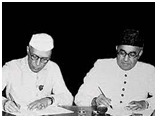Nehru-Liaquat Pact
News: Recently, Syama Prasad Mookerjee’s death anniversary was observed. In response to the contentious Nehru-Liaquat Pact, he left JL Nehru’s cabinet in April 1950.
In 1950, India and Pakistan came to a post-Partition accord known as the Liaquat-Nehru Pact.
The agreement sought to address how minorities were treated in both nations and to grant them security and equal rights.
Syama Prasad Mookerjee, a member of the Hindu Mahasabha and a member of Nehru’s first Union Cabinet, disagreed with the agreement, however.
The date June 23 marks the 70th anniversary of Syama Prasad Mookerjee’s passing.
On April 8, 1950, Jawaharlal Nehru, the Prime Minister of India, and Liaquat Ali Khan, the Prime Minister of Pakistan, signed the Nehru-Liaquat Pact, commonly known as the Delhi Pact.
Due to racial tensions and violence that occurred during the Partition of India in 1947, the goal was to create a framework for the treatment of minorities in India and Pakistan.
The Pact’s provisions permitted refugees to return in safety and peace to dispose of their belongings.
The return of stolen goods and kidnapped women was required.
Derecognized were forced conversions.
Rights for minorities were confirmed.
establishing minority commissions in Pakistan and India
nations should provide full citizenship equality for minorities in both nations
Countries will safeguard minorities’ freedom of movement within each nation as well as their freedom of employment, expression, and religion.




